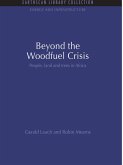Over 60 million people live in the SADCC countries; by 2000 AD the number will be over 100 million. The vast majority, city-dwellers as well as farmers, rely on wood fuel for domestic use. Supplies are diminishing as consumption grows. The quality of life is deteriorating yet further and the environment is more and more degraded.
But these phenomena are not simply the consequence of a wood shortage which might be cured by some cropping and management policy. They flow from a complex network of causes each contributing in its way to growing poverty and want which has, as one obvious symptom, the shortage of fuel for life's basic purposes.
The authors, by means of case studies, examine those causes throughout the nine SADCC countries and consider the policies that can be developed there which will not only help to alleviate the symptom but will help to prevent the imminent catastrophe which it represents.
Originally published in 1988
But these phenomena are not simply the consequence of a wood shortage which might be cured by some cropping and management policy. They flow from a complex network of causes each contributing in its way to growing poverty and want which has, as one obvious symptom, the shortage of fuel for life's basic purposes.
The authors, by means of case studies, examine those causes throughout the nine SADCC countries and consider the policies that can be developed there which will not only help to alleviate the symptom but will help to prevent the imminent catastrophe which it represents.
Originally published in 1988
Dieser Download kann aus rechtlichen Gründen nur mit Rechnungsadresse in A, B, BG, CY, CZ, D, DK, EW, E, FIN, F, GR, HR, H, IRL, I, LT, L, LR, M, NL, PL, P, R, S, SLO, SK ausgeliefert werden.









